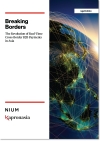Latest Insight
- Why cash is still prevalent in Asia
- Japan steps up green finance efforts
- South Korea charts middle path on crypto
- Should Grab and GoTo merge?
- Singapore pushes ahead with fintech-driven sustainability
- Digital banks in South Korea continue to thrive
- Billease is the rare profitable BNPL firm
- Fintech sector in Pakistan faces mounting challenges
- Where digital banks in Asia can make a difference
- Cashless payments jump in Vietnam
Latest Reports
-
Breaking Borders
 Despite progress in payment systems, the absence of a unified, cross-border Real-Time Payments (RTP) network means that intermediaries play a crucial role in facilitating connectivity. This report examines the ongoing complexities, challenges, and initiatives in creating a seamless payment landscape across Asia. Innovate to Elevate
Despite progress in payment systems, the absence of a unified, cross-border Real-Time Payments (RTP) network means that intermediaries play a crucial role in facilitating connectivity. This report examines the ongoing complexities, challenges, and initiatives in creating a seamless payment landscape across Asia. Innovate to Elevate In the dynamic and diverse financial landscape of the Asia-Pacific (APAC) region, banks are at a pivotal juncture, facing the twin imperatives of innovation and resilience to meet evolving consumer expectations and navigate digital disruption. Catalyzing Wealth Management In The Modern Era
In the dynamic and diverse financial landscape of the Asia-Pacific (APAC) region, banks are at a pivotal juncture, facing the twin imperatives of innovation and resilience to meet evolving consumer expectations and navigate digital disruption. Catalyzing Wealth Management In The Modern Era Hyper-personalized wealth management presents a paradigm shift from traditional models relying on static, generalized segments. Developing tailored investor personas based on psychographics, behaviours and fluid financial goals enables financial institutions to deliver rich and tailored customer experiences that resonate with next-generation priorities.
Hyper-personalized wealth management presents a paradigm shift from traditional models relying on static, generalized segments. Developing tailored investor personas based on psychographics, behaviours and fluid financial goals enables financial institutions to deliver rich and tailored customer experiences that resonate with next-generation priorities.
Events
| April 23, 2024 - April 25, 2024 Money 2020 Asia 2024 |
| October 21, 2024 - October 24, 2024 Sibos Beijing |
| November 06, 2024 - November 08, 2024 Singapore Fintech Festival |
With a population of 169 million, of whom 40% to 50% lack a bank account, Bangladesh is a prime candidate for digital banks. Unlike the advanced economies of East Asia, Bangladesh can genuinely benefit from online banks that can rapidly bring more people into the formal financial system. With that in mind, the Bangladeshi central bank in June announced that it is ready to approve a framework for digital banks.
Digital transformation in Japan’s financial sector has been a gradual process, with the earliest pure-play online lenders dating back to the early 2000s, but limited change occurring until recently. Among East Asia’s developed economies, Japan is unique in that it has an unusual number of barriers to digitization of financial services: limited financial inclusion needs, a deep affinity for cash, a comprehensive and mature banking system with branches almost anywhere customers would need them, and the world’s most elderly population. That said, the pandemic spurred Japan to speed up financial digitization, and the trend is proving to be enduring.
When will Ant Group’s transformation be complete? Once China’s and probably the world’s most prominent fintech firm, the company has been caught up in political and regulatory headwinds since November 2020. Each time the light at the end of the tunnel has seemingly been in view, the expected revival of its IPO – the only definitive signal that would signal the company were out of the woods – has failed to materialize. Recent moves by Ant Group suggest that it still has some work to do before its transition to a technology company that works for the national interest is complete. That seems to be what Beijing expects of Ant.
Platform companies in Southeast Asia all want to capitalize on fintech opportunities, but Indonesia’s Bukalapak may be better positioned than others to do so. The reason is simple: First of all, Bukalapak’s core offering is e-commerce, which is the online service that best syncs with digital financial services, especially compared to something like ride hailing. Sorry, Grab and Gojek. Second, Bukalapak is based in Indonesia, which has a huge unbanked but digitally forward population. The company can ride the waves of both surging e-commerce and digital finance adoption rates.
For the longest time, the China payments market was an oligopoly of the privileged three: first the state-owned UnionPay, and then as the country transitioned to mobile payments, Alipay and Tenpay. U.S. card giants like Visa, Mastercard, and American Express as well as PayPal could only look on with envy and frustration as Beijing kicked the can down the road on boosting market access – which was supposed to have been complete by 2006 per the conditions it agreed to upon accession to the World Trade Organization in 2001.
It was bound to happen: South Korea’s most successful digital bank has started to have global – or at least regional – ambitions. Kakao Bank is one of the few digital lenders in Asia to reach profitability quickly (within just two years) and stay there. In fact, Kakao accomplished the unlikely feat of reaching profitability and going public within five years. One of the reasons Kakao has been successful is that it has eschewed gung-ho global expansion, which has helped keep its costs at a more reasonable level than most neobanks. Now, however, it is eager to try its hand in several Southeast Asian markets.
They say it’s lonely at the top, and once you get there, someone always wants to take you down. Revolut must feel that way. It towers above most fintech startups in this era of slashed valuations, more-demanding investors and scaled-down expansion. Though Revolut’s valuation has fallen from the absurdly high US$33 billion of 2021 to a still-lofty $18 billion today, its ambitions have not diminished. The company is trumpeting the fact it now has 30 million retail customers. But there remains one factor that could cut Revolut down to size: being denied a banking license in the UK.
The paramountcy of the SWIFT interbank messaging network to cross-border payments can be measured in many ways, and SWIFT itself likes to do so with its data on transaction numbers and amounts. For instance, as of December 2022, Swift had recorded an average of 44.8 million FIN messages (payments and securities transactions) per day during the year, a year on year rise of 6.6%.
Across Asia’s emerging markets, earned wage access (EWA) has been gaining traction rapidly in the past two years. In a nutshell, EWA platforms allow employees of a company to access a portion of their earned pay before payday. EWA is catching on fast in some of Southeast Asia’s largest emerging markets where per-capita GDP remains relatively low and significant portions of the population are either unbanked or underbanked.
How many platform companies outside of China have been able to make the super app concept work? Last time we checked, the only profitable one with a thriving fintech unit is Korea’s Kakao, and the jury is still out on that company. Unlike Korea or China though, Southeast Asia is an extremely heterogenous market – if we can even call a region with 11 countries that speak many different languages a single “market” – which means that a one-size-fits-all super app was never going to be an easy sell. On top of that, Southeast Asia’s consumers have limited spending power while competition in digital services is intense. Grab’s first-quarter performance highlights the challenge platform companies in the region face.
More...
This commentary was written in collaboration with Banking Circle.
The majority of cross-border payments are currently carried out via telegraphic transfers supported by SWIFT’s network of correspondent banks. These transfers are often criticized for being slow and expensive. A transfer can take several days to complete, while the World Bank estimates the average cost of a transaction to be about 6% of the transfer value.
In East Asia, digital banks often are incumbent banks and tech giants in disguise, not so much disrupting the market as putting a new spin on an old story. There are exceptions though, and the Philippines is arguably the most prominent. A unique confluence of factors, from its unique island geography (it has about 2,000 inhabited islands) to complacent incumbents to a significant unbanked population to a central government plan that relies on digital finance to rapidly boost financial inclusion, has given online lenders a real chance to shake up the market and challenge incumbent lenders.
In its competition with Hong Kong to be Asia’s top fintech hub, it is pretty clear Singapore has won. Its linkages to Southeast Asia and India – where the fintech growth story is – are superior, while Hong Kong is more narrowly focused on mainland China, where fintech peaked a while back. Singapore also weathered the pandemic better. That said, Hong Kong is emerging as a strong player in green finance, with some analysts giving it the edge over Singapore.
Since China unveiled the digital renminbi several years ago, it has been hyped as a juggernaut that would dethrone the dollar in the international financial system while relegating China’s domestic e-payments duopoly of Alipay and Tenpay to supporting roles. The digital yuan’s biggest boosters – usually not Chinese policymakers – made such predictions without offering compelling evidence to support their arguments.
It’s all about financial inclusion: That’s why buy now, pay later (BNPL) is continuing to grow briskly in Indonesia, why regulators are maintaining a light touch, why venture capitalists and others keep pouring money into the country’s BNPL firms. Indonesia has an unbanked population of 181 million that is larger than the populations of most countries and many more underbanked people. Interest-free (if you pay on time) installment payments seamlessly integrated into e-wallets could become a dominant form of de facto credit in the country.















